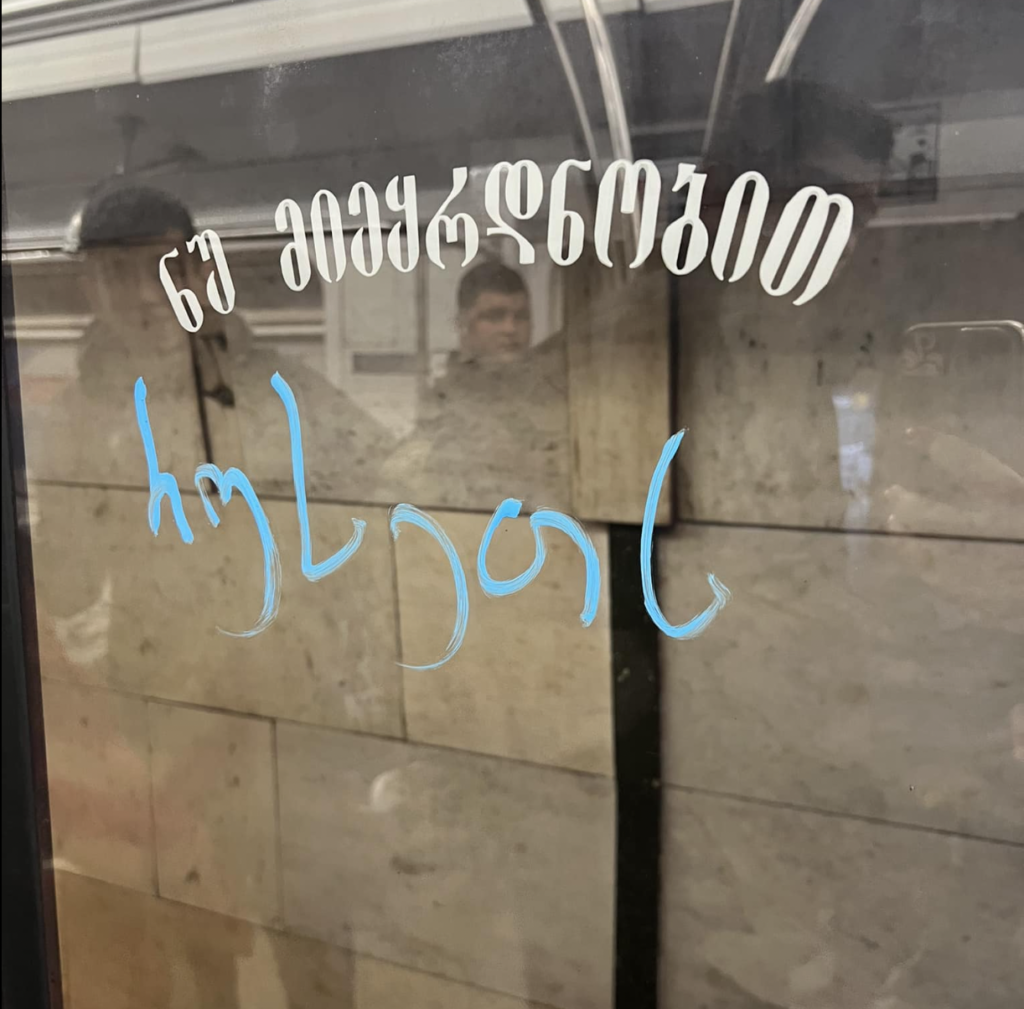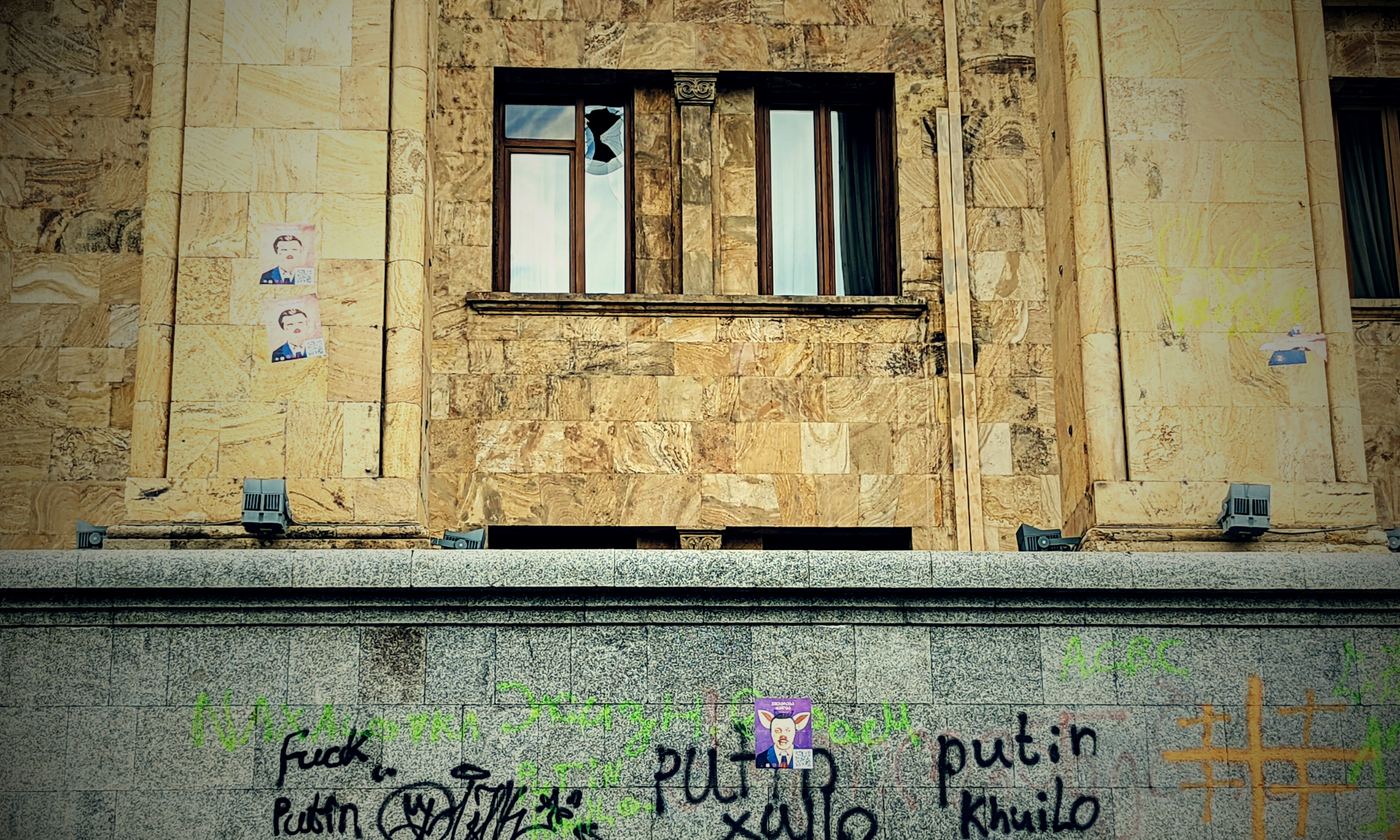Dispatch – April 15: Rematch
“What still surprises me is the way love and hate can coexist in this country – and the speed with which both move,” Carl Hartzell, former EU ambassador to Georgia, told Voice of America in July 2022. The diplomat had spent four years in Georgia and saw its best and worst. He had lived through the pandemic, heightened political turbulence, and two deeply polarized elections in 2020 and 2021 – with the bonus of the ex-president’s surprise return and his imprisonment controversy. He saw the compromise deals he had helped to seal quickly unravel. He suffered repeated attacks – first from the opposition, which accused him of unfairly legitimizing the 2020 elections, and then from ruling party leaders who, on his way out, blamed him for Georgia’s initial failure to secure the EU candidacy.
“I still have to analyze all this,” Hartzell, obviously exhausted, said weeks before his tenure ended. We hope the ambassador—wherever he is now—has finally found his peace because we have yet to find ours. All the love and hate the diplomat spoke of has since grown in size and pace. And as Georgia prepares for the foreign agents’ law rematch, the intensity of these emotions may determine the ultimate winner.
Here is Nini and the Dispatch newsletter. Below we will talk about the opposite energies that dominate present-day Georgian politics and may define the outcome of the foreign agent battle #2
1. Unity vs Divisions
Georgians glorify unity because they haven’t seen much of it. “Polarization” may seem like an invention of naive Western diplomats to some, but it’s hard to forget how we used to worry about potential “civil confrontations” not so long ago. While the current government likes to make everything about its predecessor – whose rule ended more than 11 years ago – one can trace the roots of today’s divisions as far as the last century. For more than three decades of the country’s independence, different groups of Georgians have repeatedly hurt and oppressed each other, and society as a whole has failed to show due empathy and justice to the victims. Alleged perpetrators would remain in power or make successful comebacks. And the new rulers, instead of striving for reconciliation, would go on to exacerbate divisions they once decried for their own political gain.
Yet, the glorification of unity also means that open, blatant attempts to divide society will not be easily tolerated. And that’s what the current situation is about: Foreign Agents Law #2 came out of nowhere, just as Georgians were rejoicing in rare unity after the historic football victory – one of the things that still transcends the partisan and other cleavages. It will be hard for the Georgian Dream to point fingers at the opposition this time, as the latter had been mostly preoccupied with its own campaign preparations when the news of the controversial bill’s resurrection came. Now it is the Georgian Dream that looks like a disrupter of public peace. And nobody loves disrupters: instead of winning new supporters ahead of elections, the party risks alienating its stability-loving base.
2. Alienation vs Communication
All trouble starts with alienation, and there’s no shortage of that in Georgia either. Urban-rural isolation and economic disparities can make those living outside the capital feel excluded from the political process. The ruling party will try to use this to portray the resistance to the law as an endeavor of the wealthy Tbilisi bubble (didn’t they coin the vilifying term “rich NGOs”?!) and paint the street protesters consisting of drug-addicted club-goers. But this alienation shouldn’t be hard to overcome in a small, close-knit, humor-loving country. “Everybody knows everybody” here, and many have relatives who work for NGOs and the media or at least trust those many diverse, visible public figures who are speaking out against the law.
3. Patriotism vs Patriotism
Contemporary Georgian political discourse largely revolves around two versions of patriotism: the one that takes pride in its anti-imperial struggle against Russia in the name of freedom and the one that focuses on the staying power of traditions, Christian identity, and conservative values for the nation’s survival.
The current political and religious elite has invested in using conservative patriotism and grafted anti-Western and anti-liberal narratives onto it. At first glance, they have succeeded. But it’s hard to say whether this tactic is actually winning them support – its only result might be to give new names to old political divisions.
The two patriotic energies are not necessarily mutually exclusive and have shown a perfect ability to blend and overlap (well, at least they did in my terrible school essays). Nor does that seeming conflict of patriotism seem to affect the anti-Russian or pro-Western consensus, which is on display with every public opinion poll.
The only way for the ruling party to push the law through is by reassuring its supporters that it has nothing to do with Moscow. And this is a hard job. Even the appeal to national pride and sovereignty has its limits. Those with pride hate to be alone in their pride. Georgians love nothing more than to see their culture and tradition internationally recognized, acclaimed, and applauded.
Given that those who best embody that pride – from writers to athletes to top national dance choreographers like the Sukhishvili family – oppose the law and warn of international isolation, the ruling party may struggle to convince people that they are right and everyone else is wrong.
4. ‘Don’t lean’ vs ‘Don’t tell me what to do’
Georgians exude a strong “don’t tell me what to do” attitude. Just get on any train in the Tbilisi metro during off-peak hours and look at the doors with the “Don’t lean” safety sign. Well, you probably won’t see that sign because there’s always some guy leaning on it, even when there are plenty of vacant seats.
We’ll leave it to our fellow anthropologists to figure out where this “do the opposite of what you are told” attitude comes from. The Georgian Dream tried to tap into that spirit of contradiction and turn it against the West, which, emboldened by Georgians’ stated desire to be its part, had the audacity to – you guessed it – tell us what to do.
Still, the ruling party may find itself facing the fuzzy end of that stick since GD leaders have gone from asking to nagging to dictating what to do to civil servants and supporters.

5. Management vs Common Sense
Georgian Dream leaders appear to believe that if you invest enough resources (which they have in abundance), you can indeed “have your way.” There is nothing and no one you cannot manage, and the ruling party’s optimism may actually come from their own successful record in holding onto power. But such things work out until they don’t.
Right now, lost in their attempts to micromanage the country, GD members seem to have further detached themselves from reality. Few can understand how they hope to get away with the law a year after its bitter, crushing defeat: one thing different from last March is that the widespread shaming has left the party even more intellectually isolated and trapped in its own delusions. No public figure or intellectual with a modicum of reputation is willing to back them.
And recent GD moves of adding insult to injury show that they might have completely lost control (and their minds): they registered the Russia-style bill on the eve of April 9, the most sensitive date when it comes to anti-Russia sentiments; party speaker raised the theoretical point about Europe repressing the Georgian language just before April 14, a date commemorating the Georgian struggle against the Soviet/Russian effort trying to erase Georgian as a state language in 1978; Mayor Kakha Kaladze insulted the family of Giorgi Kochorashvili – a football player who emerged as something of a national hero in the recent qualifying matches – for suggesting his pro-EU sentiments.
The only explanation we can think of is that the growing isolation left the party without what Jürgen Habermas might have meant by communicative rationality (well, sorry if that’s a wrong reference, but as you might have already noticed, misinterpreting Germans is our new national hobby).
6. Love vs Hate
However, these signs of fast-moving political dementia make the GD more, rather than less, frightening. If they have shut themselves down from the rational argument, the main battle will be fought between the government/ruling party on one side and the people on the other. It is no longer, or not that much, about pre-existing cleavages when the ruling power disregards the views and wishes of an absolute majority.
Those who are committed to protecting their democratic values will have to deal with the force, technologies, and tricky tactics the government will use to exhaust, intimidate, and divide the protesters – whether in the streets, in the media, or anywhere else.
Georgia’s pro-democracy and pro-EU majority knows it has numbers and is unlikely to give their dreams easily, especially when – as Chancellor Scholtz has pointed out – the door is open after such a long wait.
All dominant versions of patriotism in Georgia honor the heroic, unequal struggle, and respect sacrifice, though without normalizing it: in recent history, no protest-related casualty has been a minor casualty, and God forbid someone gets hurt, those in the government may never recover.
As for the opposing camp, GD may plaster the country with posters from its own presses, but very few on their payroll would willingly hit the streets with passion. Many of their voters are merely those who are looking for stability or have struggled to find a viable alternative to support their livelihoods. They are most likely to stay at home, watch developments, and then go with the flow while allowing those in the streets to define which way that flow goes.
The only group with violent potential that GD has traditionally relied on is its own frenemy, the far-right Alt-Info. And the last time we checked, those Alt-Info guys were collectively and demonstratively burning Georgian Dream flags after they were treacherously prevented from registering for the October elections.
The legislative process for the foreign agents’ law starts Monday, April 15. All chips are in. May next week’s Dispatch be of normal size and bring you optimistic tidings.
